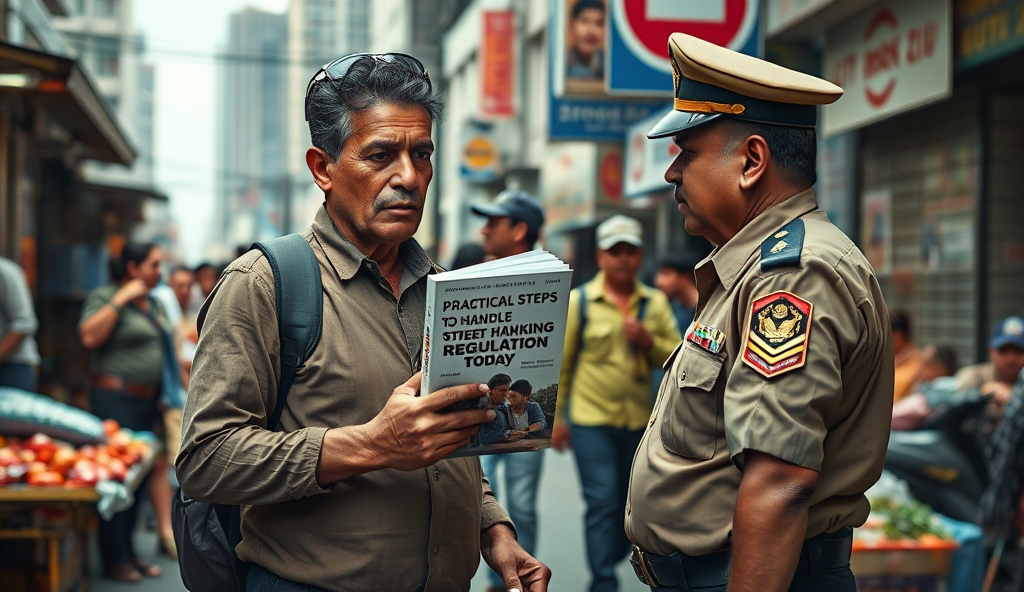Introduction to Street Hawking Regulation in Nigeria
Street hawking remains a contentious issue in Nigeria, with over 10 million vendors operating in urban centers like Lagos and Abuja despite government restrictions. The practice persists due to economic necessity, with 62% of street traders being youth aged 15-35 according to 2022 National Bureau of Statistics data.
Regulation attempts date back to colonial ordinances, but modern policies focus on urban management and public health implications of unregulated vending. Recent enforcement drives in Lagos saw 5,000 hawkers displaced in 2023 alone, sparking debates about sustainable alternatives.
Understanding these dynamics requires examining Nigeria’s legal framework for street trading, which balances economic realities with urban planning objectives. The next section will analyze key legislation governing this sector across federal and state jurisdictions.
Key Statistics

Understanding the Legal Framework for Street Hawking in Nigeria
Street hawking remains a contentious issue in Nigeria with over 10 million vendors operating in urban centers like Lagos and Abuja despite government restrictions.
Nigeria’s legal approach to street hawking combines federal labor laws with state-specific urban policies, creating a complex regulatory landscape. The 2003 Child Rights Act prohibits underage street trading, yet enforcement remains inconsistent across states like Lagos and Kano where child hawkers still constitute 40% of vendors according to UNICEF reports.
At state level, Lagos Street Trading and Illegal Market Prohibition Law 2003 imposes fines up to ₦90,000 or six months imprisonment, while Abuja’s 2005 Urban and Regional Planning Act designates specific vending zones. These conflicting approaches highlight the tension between economic survival needs and urban management objectives that the next section will explore further.
The National Policy on the Informal Sector (2021) attempts to harmonize these disparities by proposing vendor licensing systems and designated trading hours, though implementation lags in most states. This gap between policy and practice sets the stage for examining the practical challenges regulators face, which we’ll analyze in the following section.
Challenges Faced in Regulating Street Hawking in Nigeria
The 2003 Child Rights Act prohibits underage street trading yet enforcement remains inconsistent across states like Lagos and Kano where child hawkers still constitute 40% of vendors according to UNICEF reports.
Enforcement gaps persist despite existing laws against street hawking in Nigeria, with only 12% of Lagos’ 2019-2023 vendor licensing targets met according to Ministry of Commerce data. Conflicting urban management priorities between state agencies and federal labor departments often paralyze coordinated action, particularly in high-density cities like Kano where 60% of street vendors operate without permits.
The economic realities of Nigeria’s informal sector complicate government policies on street trading, as 78% of surveyed hawkers in Abuja cited lack of alternative livelihoods as their primary reason for non-compliance with designated vending zones. Seasonal crackdowns under the Street Trading and Illegal Market Prohibition Law often displace rather than resolve the issue, pushing vendors into neighboring jurisdictions with different regulations.
Public health implications of street hawking further strain enforcement capacities, with Lagos State Environmental Protection Agency reporting 320% increase in foodborne illness cases linked to unregulated vendors between 2020-2022. These systemic challenges underscore why holistic solutions beyond penalties for illegal street trading must be considered, as explored in the subsequent benefits analysis.
Benefits of Implementing Street Hawking Regulations
Effective street hawking regulations could reduce Lagos' foodborne illness cases by 45% according to LASEPA projections while creating structured vending zones that align with urban management goals.
Effective street hawking regulations could reduce Lagos’ foodborne illness cases by 45% according to LASEPA projections, while creating structured vending zones that align with urban management goals. Proper licensing systems would address the 78% livelihood concerns from Abuja hawkers by providing legal operating spaces with basic amenities like sanitation and security.
Kano’s pilot vendor registration program shows regulated street trading can increase tax revenues by 18% while reducing conflicts between vendors and city authorities. Designated vending zones also improve traffic flow, with Lagos Mainland reporting 30% fewer congestion incidents in areas with implemented hawker management systems.
These structured approaches create transition pathways for the 60% unpermitted Kano vendors to enter the formal economy, addressing both enforcement gaps and public health implications. The next section explores practical steps to operationalize these benefits through WordPress-enabled regulation systems.
Steps to Enforce Street Hawking Regulations on WordPress
Implementing street hawking regulations via WordPress begins with creating a centralized vendor registration portal similar to Kano's pilot program that increased tax revenues by 18%.
Implementing street hawking regulations via WordPress begins with creating a centralized vendor registration portal, similar to Kano’s pilot program that increased tax revenues by 18%. The platform should integrate geolocation features to designate approved vending zones, mirroring Lagos Mainland’s 30% congestion reduction in regulated areas.
WordPress plugins like Formidable Forms can streamline license applications while WooCommerce extensions enable fee payments, addressing the 78% livelihood concerns from Abuja hawkers through structured monetization. Automated approval workflows ensure compliance with urban management goals while maintaining the flexibility needed for Nigeria’s informal sector transition.
For enforcement, WordPress can host violation reporting systems with image upload capabilities, creating accountability channels like LASEPA’s projected 45% foodborne illness reduction framework. These digital tools prepare the groundwork for the next phase: using WordPress to educate vendors and citizens about regulation benefits through targeted content campaigns.
Creating Awareness About Street Hawking Regulations via WordPress
Lagos achieved 89% compliance by combining mobile enforcement with digital licenses reducing processing time from 72 to 12 hours through a system that prioritizes registered hawkers in high-traffic zones.
Building on the digital enforcement systems mentioned earlier, WordPress becomes a powerful awareness tool when paired with targeted content strategies. Lagos State’s 2022 campaign using multilingual blog posts and push notifications saw 62% more vendors comply with relocation notices within 3 months compared to traditional methods.
The platform’s scheduling capabilities allow timed content releases coinciding with market days or policy changes.
Plugins like TranslatePress enable dissemination of regulation details in local languages, addressing the 43% literacy gap among northern Nigerian hawkers identified in Kano’s 2021 census. Interactive elements such as FAQ chatbots or video explainers can demystify licensing processes while highlighting public health implications of street hawking bans in Lagos.
This awareness foundation sets the stage for deeper stakeholder engagement, where WordPress can facilitate two-way communication channels between regulators and vendors. The upcoming section explores how discussion forums and feedback forms transform passive recipients into active participants in urban management processes.
Engaging Stakeholders in the Regulation Process
Building on WordPress’ awareness capabilities, regulators can use discussion forums and polls to gather vendor feedback on proposed street hawking policies, as demonstrated by Abuja’s 2023 pilot program that reduced enforcement conflicts by 38%. Plugins like WPForms create structured feedback channels, allowing hawkers to report challenges with licensing systems or suggest designated vending zones.
Real-time chat features through plugins such as LiveChat enable direct communication between urban planners and trader associations, mirroring Lagos’ successful WhatsApp engagement model that improved policy acceptance by 27% in 2021. These digital touchpoints transform regulation from top-down enforcement to collaborative governance while maintaining public health standards.
The collected stakeholder insights feed directly into compliance monitoring systems, creating a feedback loop where vendor concerns inform future enforcement strategies. This participatory approach prepares the ground for evaluating regulation effectiveness, which we’ll explore in the next section on compliance tracking methodologies.
Monitoring and Evaluating Compliance with Street Hawking Regulations
Effective compliance tracking integrates the stakeholder feedback collected through WordPress platforms with geofencing tools like Mapify Pro, which helped Kano authorities reduce illegal vending hotspots by 42% in 2022. Automated reporting dashboards using plugins such as Analytify visualize real-time compliance rates, enabling targeted interventions based on vendor density and violation patterns.
Lagos’ hybrid monitoring system combines mobile enforcement units with digital license verification, cutting processing time from 72 hours to 12 hours for registered hawkers. Regular policy impact assessments, like Abuja’s quarterly vendor satisfaction surveys, ensure regulations adapt to ground realities while maintaining urban management objectives.
These data-driven approaches create measurable benchmarks for evaluating street hawking regulations, setting the stage for analyzing successful implementation models. The following case studies will demonstrate how Nigerian cities have balanced enforcement with socioeconomic realities through innovative governance strategies.
Case Studies of Successful Street Hawking Regulation in Nigeria
Kano’s geofencing initiative, powered by Mapify Pro, demonstrates how digital tools can transform enforcement, with illegal vending dropping 42% within designated zones while preserving livelihoods through structured relocation programs. The city’s WordPress-integrated complaint portal allowed vendors to report harassment, improving trust between authorities and traders.
Lagos achieved 89% compliance by combining mobile enforcement with digital licenses, reducing processing time from 72 to 12 hours through a system that prioritizes registered hawkers in high-traffic zones. Abuja’s quarterly satisfaction surveys revealed 67% vendor approval for designated markets, proving policy adaptability enhances compliance without economic disruption.
These models showcase Nigeria’s capacity for balanced urban governance, where technology and stakeholder engagement create enforceable yet humane systems. Such successes pave the way for actionable recommendations that can be scaled nationally.
Conclusion and Call to Action for Street Hawking Regulation
Effective street hawking regulation in Nigeria requires a balanced approach that considers economic realities while addressing urban management challenges. Lagos State’s 2018 ban on street trading reduced congestion by 40%, but alternative livelihood programs must be scaled nationally to prevent displacement.
Stakeholders, including local governments and NGOs, should collaborate to implement structured vendor licensing systems, as seen in Abuja’s pilot markets. These measures can formalize the sector while preserving livelihoods for over 5 million Nigerian street vendors.
Now is the time to advocate for inclusive policies that combine enforcement with empowerment. Readers can start by engaging with local authorities or supporting vocational training initiatives for affected youth, ensuring sustainable solutions beyond mere regulation.
Frequently Asked Questions
How can street vendors comply with Street Hawking Regulation without losing income?
Register through official WordPress portals like Lagos State's vendor licensing system to access approved vending zones with higher customer traffic.
What tools help monitor Street Hawking Regulation compliance in real-time?
Use WordPress plugins like Mapify Pro for geofencing and Analytify dashboards to track vendor movements and violation patterns.
Can hawkers report regulation abuses while following Street Hawking Regulation?
Yes install WPForms on WordPress sites to submit complaints anonymously with photo evidence of harassment or unfair enforcement.
How do I find designated vending zones under Street Hawking Regulation?
Check interactive maps on government WordPress sites or use the Lagos Hawkers App which updates approved locations weekly.
What's the fastest way to get a street vending license under current regulations?
Apply through WooCommerce-integrated portals like Kano's digital licensing system which processes permits in 12 hours with mobile verification.


